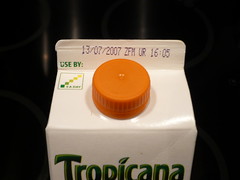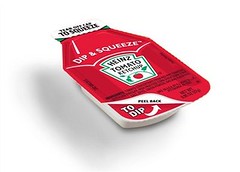Here’s a fascinating preview of an article on home food waste that’s due out in the spring (sort of like the movie trailer of the magazine world!). Based on the online piece, I can’t wait to read the real thing.
— —
A comment on the above page led me to discover my new favorite Danish phrase: Stop Spild Af Mad. Very cool.
— —
I just heard from Lovin’ Spoonfuls, a Massachusetts-based food rescue group with a  catchy name. In addition to recovering food for hungry people, they rescue dog food for hungry pups.
catchy name. In addition to recovering food for hungry people, they rescue dog food for hungry pups.
— —
A friend (thanks, Erica) told me about a Ziploc ad (played durin g the Olympics) that cite food waste stats a few times. I haven’t seen them, but they’re for this new kind of bag. Anyone else catch this commercial?
— —
Has your crisper drawer become a Slime-O-Tron 2000? The Non-Consumer Advocate reiterates a few tips from a classic post on how she reduces waste at home.
 Although I did find it interesting that neither the topic nor the word ‘waste’ were written or spoken.
Although I did find it interesting that neither the topic nor the word ‘waste’ were written or spoken.
 Fast food joints are notorious for tossing in way too many packets of ketchup. If they continue this trend, it could lead to more waste, as the above link suspects. But, maybe stores will wise up and only give one packet now, knowing that they’re much bigger and cost a bit more. I’m gonna guess they lead to more waste. Hope I’m wrong.
Fast food joints are notorious for tossing in way too many packets of ketchup. If they continue this trend, it could lead to more waste, as the above link suspects. But, maybe stores will wise up and only give one packet now, knowing that they’re much bigger and cost a bit more. I’m gonna guess they lead to more waste. Hope I’m wrong.